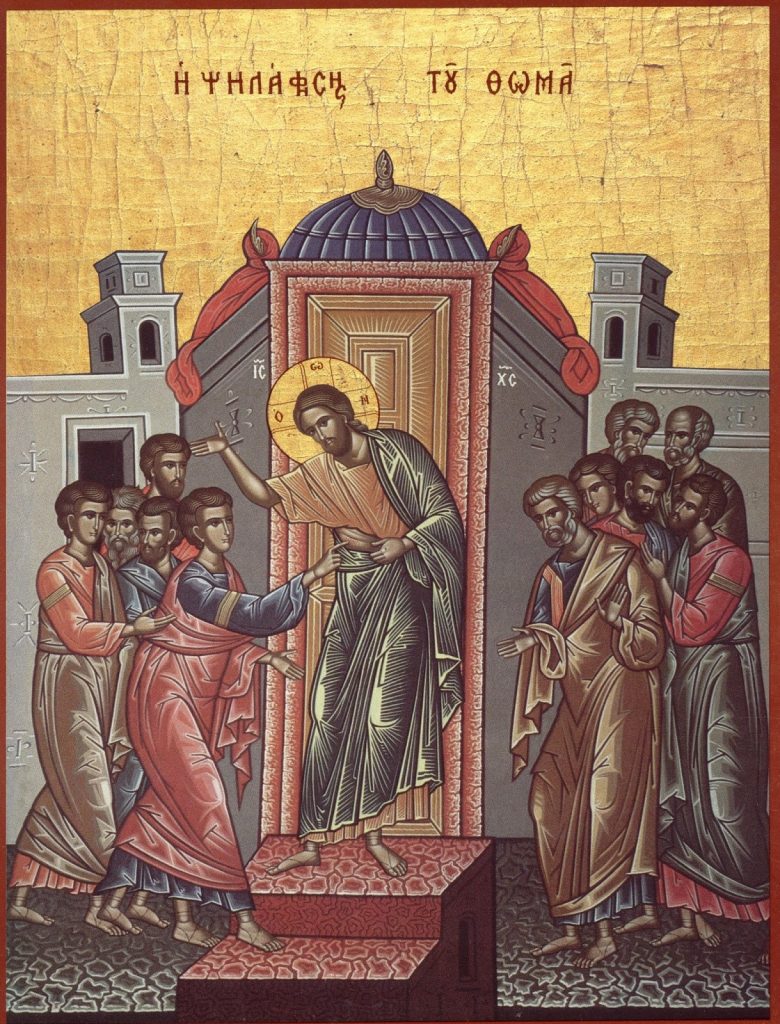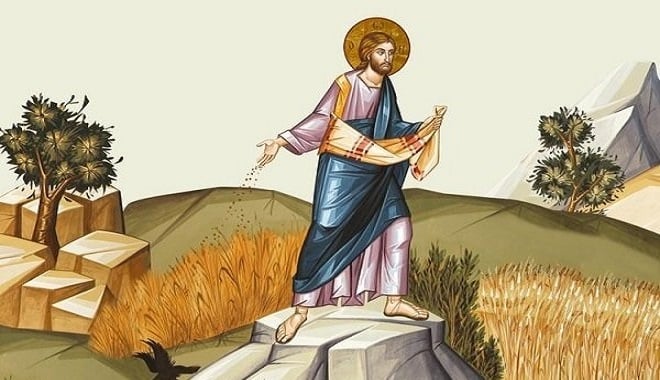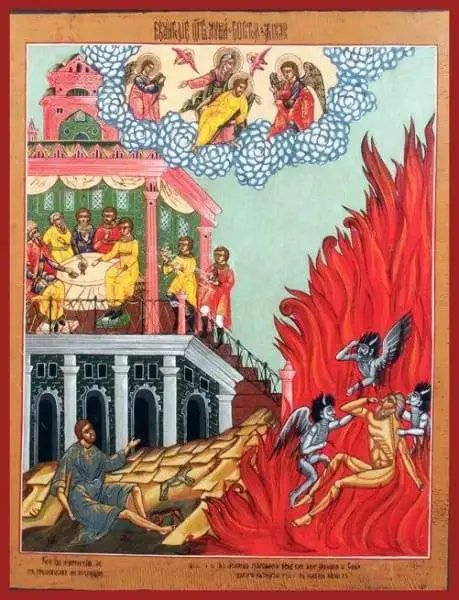
CHRISTOS VOSKRESE, CHRIST IS RISEN, CHRISTOS ANESTI.
In the name of the Father, and of the Son, and of the Holy Spirit. Amen.
My beloved brothers and sisters in Christ,
Today, on this first Sunday after Pascha, we commemorate what the Holy Orthodox Church names Thomas Sunday. Having only just passed through the radiant joy of the Lord’s Resurrection, our gaze now turns to a moment that took place eight days later: the appearance of the Risen Christ to the Apostle Thomas.
The Holy Gospel according to Saint John tells us that when Christ first appeared to His disciples on the evening of His Resurrection, Thomas was not among them. When the others joyfully declared that they had seen the Lord, Thomas famously responded, “Unless I see the mark of the nails in His hands, and place my finger into the mark of the nails, and place my hand into His side, I will not believe” (John 20:25).
This response has echoed down the centuries, earning him the nickname Doubting Thomas. Yet, if we look more closely, we see not a hardened unbelief but rather a heart longing to encounter the same Risen Lord his fellow apostles had seen. His doubt was not rooted in rebellion but in a deep desire for the same certainty, the same closeness. It was the doubt of a soul reaching out in hope.
Eight days later, Christ came again, this time when Thomas was present. And what grace our Lord shows. He addresses Thomas not with reproach but with gentleness: “Reach out your finger and see My hands. Reach out your hand and place it in My side. Do not be faithless, but believing” (John 20:27).
See how tenderly the Saviour meets him. He does not scold. He does not shame. He remembers every word Thomas had spoken and responds with compassion. In this moment, we glimpse the boundless mercy of God, a God who stoops down to meet us in our frailty, who does not abandon us in our wrestling but comes to us where we are.
Thomas’s response is immediate and complete: “My Lord and my God!” (John 20:28). This is not merely an acknowledgement of Christ’s resurrection but a profound confession of His divinity. In five words, Thomas utters one of the clearest declarations of Christ’s dual nature: fully God and fully man.
Saint Gregory the Theologian notes that in this very moment, Thomas “theologised the dual nature of Christ.” That which began as hesitation has now given rise to one of the most important statements of Orthodox faith.
And the Lord replies, “Because you have seen Me, you have believed. Blessed are those who have not seen and yet have believed” (John 20:29). With these words, Christ speaks across the centuries to each of us who believe without having seen with our physical eyes.
The Apostle Peter echoes this in his epistle: “Though you have not seen Him, you love Him; though you do not now see Him, you believe in Him and rejoice with joy unspeakable and full of glory” (1 Peter 1:8). This is the very heart of faith, seeing not with the eyes of the body but with the eyes of the soul.
Dear brothers and sisters, Thomas Sunday speaks directly to our own spiritual journey. Like Thomas, we too may find ourselves at times weighed down by doubts. The Resurrection may seem distant, its reality obscured by the burdens and noise of daily life. At such moments, we may yearn to reach out and touch the wounds of Christ ourselves.
The Church, in her wisdom, places this Gospel reading immediately after Pascha because she knows well how fragile our joy can be. After the spiritual height of Pascha, we are gently returned to the rhythms of ordinary life where faith must become steady, not just ecstatic.
Saint John Chrysostom offers a comforting thought: “Thomas’s doubt has done more for our faith than the belief of the other disciples.” For when Thomas touched the wounds and believed, our own doubts are soothed by the certainty he gained on our behalf.
It is significant that Thomas wanted to see and touch the wounds of Christ. These marks of suffering were not erased from His glorified body. As Saint Gregory the Great writes, “The wounds of His body remained after the Resurrection to heal the wounds of our disbelief.” In the risen Christ, suffering is not denied; it is transfigured.
And so it is with our own wounds, our griefs, our scars, the struggles we carry. These need not separate us from God. When placed in the hands of Christ, they too can become openings for grace. Thomas’s doubt became the gateway to his great confession. So too can our woundedness become the very place where we encounter the Risen Lord.
Today marks the conclusion of Bright Week, that Paschal octave during which the Church celebrates with unbroken joy. From now on, the royal doors of the iconostasis, which remained open as a symbol of Paradise restored, are once again closed, reminding us that though we have glimpsed the Kingdom, we still journey toward its fullness.
Yet the Paschal greeting remains: Christ is Risen! For forty days, until the Feast of the Ascension, we proclaim this truth just as the disciples did, because the Resurrection is not a moment, but a new reality that we are invited to live.
According to sacred tradition, the Apostle Thomas went on to preach the Gospel in India, where he established the Church and was eventually martyred for his faith. The one who doubted became a fearless apostle, carrying the Gospel to the ends of the earth. His transformation reminds us that honest doubt, when brought to Christ, can lead to unwavering faith.
The Malankara Orthodox Church in India traces its roots to Saint Thomas’s mission, a testimony to the enduring fruits of faith born in weakness and redeemed by grace.
Faith, my dear ones, is not the absence of doubt. It is the courage to step forward even when our understanding falters. The Apostle Paul writes, “We walk by faith, not by sight” (2 Corinthians 5:7). Faith invites us to trust in the unseen, to believe in that which cannot be grasped by logic alone.
Saint Gregory of Nyssa describes the deepening spiritual journey as a movement not from darkness into light but into a luminous darkness, a sacred mystery that exceeds the limits of reason. The mystery of God is not something to be solved but to be entered with reverence.
Thomas began with the demand to see and touch. Yet in the end, his heart was opened to a greater vision. He moved beyond physical proof to the confession of divine truth: “My Lord and my God!”
So how might we respond to the message of Thomas Sunday? Let me offer three simple invitations:
First, let us not be afraid of doubt. Bring your questions to Christ, as Thomas did. He does not turn away the searching heart.
Second, let us not isolate ourselves. Thomas was absent from the community when Christ appeared. It was in the company of the faithful that he encountered the Lord. We need one another.
Third, let us embrace the blessedness of believing without seeing. Faith is not blind. It is a vision of the heart, a way of seeing beyond appearances into the truth of God’s love.
My beloved spiritual children, on this Thomas Sunday, may we bring our doubts, our wounds, and our longing into the presence of the Risen Christ. And may we, like Thomas, cry out in awe and wonder: My Lord and my God!
Let us walk the journey from uncertainty to trust, from sorrow to joy, from fear to bold proclamation. And may we live each day in the light of the Resurrection, proclaiming with unwavering hearts:
Christ is Risen!
Indeed, He is Risen!
Amen.
Copyright © 2025 The Rev. Adrian Augustus. The Russian Orthodox Church of the Archangel Michael, Blacktown, NSW


